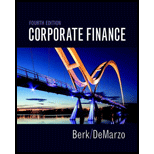
A bicycle manufacturer currently produces 300,000 units a year and expects output levels to remain steady in the future. It buys chains from an outside supplier at a price of $2 a chain. The plant manager believes that it would be cheaper to make these chains rather than buy them. Direct in-house production costs are estimated to be only $1.50 per chain. The necessary machinery would cost $250,000 and would be obsolete after 10 years. This investment could be
If the company pays tax at a rate of 35% and the
Trending nowThis is a popular solution!

Chapter 8 Solutions
Corporate Finance (4th Edition) (Pearson Series in Finance) - Standalone book
Additional Business Textbook Solutions
Horngren's Financial & Managerial Accounting, The Financial Chapters (Book & Access Card)
Operations Management
Fundamentals of Management (10th Edition)
Advanced Financial Accounting
Horngren's Accounting (12th Edition)
Business Essentials (12th Edition) (What's New in Intro to Business)
- 3-9. (Working with a statement of cash flows) Given the following information, prepare LO3 a statement of cash flows. Increase in accounts receivable Increase in inventories Operating income Interest expense Increase in accounts payable Dividends $25 30 75 25 25 15 20 Increase in net fixed assets 23 Depreciation expense Income taxes 12 17 Beginning cash 20 Increase in common stockarrow_forward3-4. (Preparing a balance sheet) Prepare a balance sheet from the following informa- LO2 tion. What is the net working capital and debt ratio? Cash $50,000 Account receivables 42,700 Accounts payable 23,000 Short-term notes payable 10,500 Inventories 40,000 Gross fixed assets 1,280,000 Other current assets 5,000 Long-term debt 200,000 Common stock 490,000 Other assets 15,000 Accumulated depreciation 312,000 Retained earnings ? MyLabarrow_forwardPlease help with questions.arrow_forward
- What is the research design? How does it work? What are the differences between Research design and Case Study research?arrow_forwardHow to judge the quality of research designs? Could you help explain and give examples?arrow_forwardConsider a situation involving determining right and wrong. Do you believe utilitarianism provides a more objective viewpoint than moral rights in this context? Why or why not? How about when comparing utilitarianism to principles of justice? Share your thoughts. Reflect on this statement: "Every principle of distributive justice, whether that of the egalitarian, the capitalist, the socialist, the libertarian, or Rawls, in the end is illegitimately advocating some type of equality." Do you agree or disagree with this assertion? Why might someone claim this, and how would you respond?arrow_forward
- I need help checking my spreadsheet. Q: Assume that Temp Force’s dividend is expected to experience supernormal growth of 73%from Year 0 to Year 1, 47% from Year 1 to Year 2, 32% from Year 2 to Year 3 and 21% from year3 to year 4. After Year 4, dividends will grow at a constant rate of 2.75%. What is the stock’sintrinsic value under these conditions? What are the expected dividend yield and capital gainsyield during the first year? What are the expected dividend yield and capital gains yield duringthe fifth year (from Year 4 to Year 5)?arrow_forwardwhat are the five components of case study design? Please help explain with examplesarrow_forwardCommissions are usually charged when a right is exercised. a warrant is exercised. a right is sold. all of the above will have commissions A and B are correct, C is not correctarrow_forward
- Principles of Accounting Volume 2AccountingISBN:9781947172609Author:OpenStaxPublisher:OpenStax College
